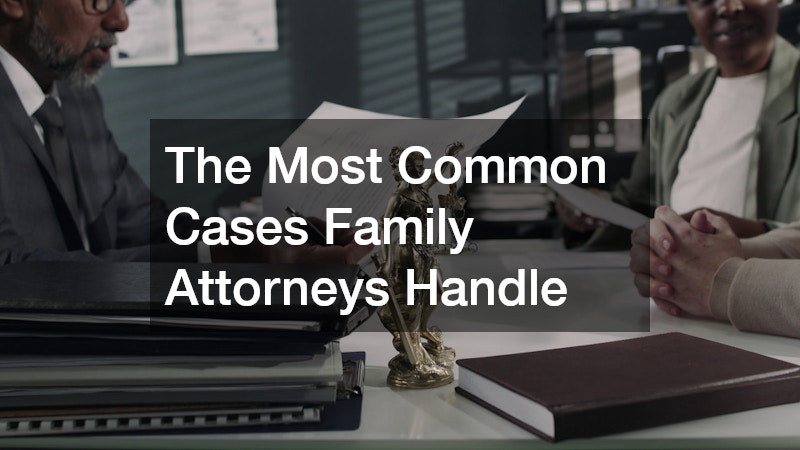
Family law is a critical area of legal practice that specifically deals with issues related to familial relationships. Family attorneys play a crucial role in resolving legal disputes within families, offering their expertise in navigating both the legal complexities and emotional challenges of family issues. The cases they handle often involve deeply personal and emotional topics, making their work not just legally intensive but also compassion-focused.
The Most Common Types of Divorce Cases
Contested vs. Uncontested Divorce
Divorce cases primarily fall into two categories: contested and uncontested. In a contested divorce, spouses are unable to agree on one or more issues, such as property division, child custody, or spousal support, requiring judicial intervention to reach a resolution.
Conversely, uncontested divorces occur when both parties agree on the terms of their separation, leading to a smoother and faster process.
Family attorneys play a pivotal role in both types of divorce. In contested divorces, they navigate through negotiations and court proceedings, advocating for their clients’ best interests while attempting to reach a fair settlement. In uncontested cases, attorneys ensure that all legal requirements are met, helping to facilitate a clean and amicable dissolution of marriage, which can save time and reduce emotional strain on both parties involved.
Division of Assets and Debts
The division of assets and debts is a crucial aspect of divorce proceedings that can often become contentious. It involves the equitable division of shared property, assets, and liabilities acquired during the marriage. Family attorneys are instrumental in this process, working diligently to achieve a fair distribution of marital property in accordance with state laws and prenuptial agreements if applicable.
Often, the division process begins with identifying what qualifies as marital property versus separate property. This determination can significantly impact how assets and debts are allocated. Attorneys help ensure that their client receives a fair share while also safeguarding any assets that remain the separate property of either spouse.
Child Custody and Support
Child custody and support are perhaps the most sensitive issues in divorce cases, impacting not just the parents but, more importantly, the children involved. Determining custody arrangements involves deciding who will have legal and physical responsibility for the child. The primary goal of family attorneys in these cases is to protect the best interests of the child, a standard that guides judicial decisions in custody disputes.
The court considers various factors when determining child custody, such as each parent’s ability to provide for the child, the child’s wishes, and any evidence of abuse or neglect. Family attorneys present evidence and arguments to support their client’s case for custody, ensuring that their rights are protected throughout the process. Additionally, they guide their clients through child support calculations, ensuring fair contributions are made for the child’s upkeep.
How Family Attorneys Handle Child Custody Disputes
Types of Custody Arrangements
Child custody arrangements can vary widely, depending on the circumstances of each family. The two major types of custody arrangements are sole custody and joint custody. Sole custody grants one parent exclusive legal and physical custody, while joint custody involves shared rights and responsibilities between both parents.
Within these broad categories are various nuances and subtypes, such as legal custody—which concerns decision-making about important aspects of a child’s life—and physical custody, which relates to where the child resides. Family attorneys assist in determining the most appropriate arrangement, aiming for solutions that are equitable and prioritizing the child’s needs. In instances where parents cannot agree, the court makes determinations based on a wide range of factors, always with the child’s best interests at heart.
Best Interests of the Child Standard
The ‘best interests of the child’ standard is central to resolving custody disputes. This legal standard considers a variety of factors, including the child’s health, safety, and emotional well-being, to ensure the most beneficial arrangement is established. Courts prioritize the child’s welfare above all else when making custody decisions.
Family attorneys contribute significantly by presenting evidence and arguments that align with this standard. They advocate for their client while keeping the child’s best interests at the forefront, sometimes involving the input of child psychologists or other professionals. This thorough approach aids the court in making an informed and balanced custody decision.
The Role of Family Attorneys in Adoption Cases
The adoption process is multifaceted, with several routes a family might pursue, each with its own legal procedures. Common types of adoptions include agency adoptions, where an agency facilitates the process, and private adoptions, which occur directly between adoptive and birth parents. Each type of adoption requires careful legal navigation to ensure compliance with state and federal laws.
The legal requirements for adoption can be extensive and complex, necessitating careful attention to detail. This includes completing comprehensive background checks, home studies, and fulfilling state-specific legal criteria. Furthermore, legal documentation, including consent forms, adoption petitions, and court post-adoption documentation, must be meticulously managed.
Adoption processes can be fraught with challenges, which may include legal, emotional, and practical obstacles. Family attorneys play a crucial role in addressing these, offering both legal advocacy and emotional support to their clients. For instance, they may deal with contested adoptions where biological parents have a change of heart or when unforeseen complications arise during the home study process.
The role of a family attorney extends beyond traditional legal advocacy; it is a commitment to assisting families in their most vulnerable moments. Whether through helping navigate the intricacies of a divorce, ensuring the welfare of a child, or facilitating the beautiful journey of adoption, these legal professionals uphold the tenets of justice while fostering the well-being of their clients. Their work remains a pillar of support in navigating the complexities of family life.





